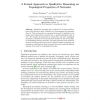148 search results - page 3 / 30 » On reasoning in networks with qualitative uncertainty |
115
Voted
FLAIRS
2000
15 years 2 months ago
2000
Qualitative probabilistic networks have been designed for probabilistic reasoning in a qualitative way. As a consequence of their coarse level of representation detail, qualitativ...
102
click to vote
EKAW
2006
Springer
15 years 2 months ago
2006
Springer
Abstract. Qualitative reasoning uses a limited set of relevant distinctions of the domain to allow a flexible way of representing and reasoning about it. This work presents a conce...
111
Voted
IJCAI
2003
15 years 2 months ago
2003
Temporal Constraint Satisfaction Problems allow for reasoning with events happening over time. Their expressiveness has been extended independently in two directions: to account f...
86
Voted
KI
2009
Springer
15 years 7 months ago
2009
Springer
Abstract. Agents interacting in a dynamically changing spatial environment often need to access the same spatial resources. A typical example is given by moving vehicles that meet ...
117
click to vote
MIDDLEWARE
2007
Springer
15 years 7 months ago
2007
Springer
This paper is about a novel rule-based approach for reasoning about qualitative spatiotemporal relations among technology-rich autonomous objects, to which we refer to as artifact...

